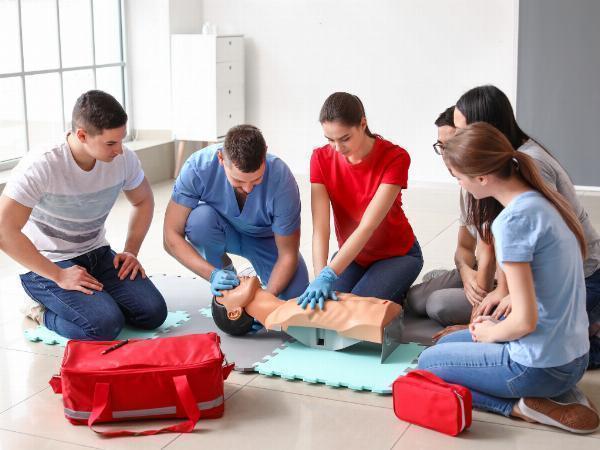Choosing the Perfect First Aid Course: A Comprehensive Guide for UK Residents

Strong 8k brings an ultra-HD IPTV experience to your living room and your pocket.
The Importance of First Aid Training
First aid training is a vital skill that everyone should possess. In emergency situations, the ability to administer basic medical assistance can make all the difference in saving a life or preventing further harm. Accidents can happen anywhere and at any time, whether it's at home, in the workplace, or in public spaces. This is why it's crucial for UK residents to undergo first aid training.
First aid training equips individuals with the knowledge and skills to provide immediate assistance until professional medical help arrives. It covers a wide range of topics, including CPR, wound care, choking relief, and basic trauma management. By learning these essential skills, you can become a valuable asset in emergency situations and potentially save lives.
Different Types of First Aid Courses
There are various types of first aid courses available to suit different needs and requirements. Understanding the differences between these courses will help you choose the one that best fits your circumstances. Here are some common types of first aid courses:
Basic First Aid Course:
This course covers the fundamentals of first aid, including CPR, wound care, and managing common injuries. It is suitable for individuals who want to learn basic life-saving skills.
Paediatric First Aid Training:
This course focuses on providing first aid to infants and children. It covers specific topics such as child CPR, choking relief, and dealing with common childhood injuries. Paediatric first aid training is essential for parents, teachers, and anyone working with children.
Level 3 First Aid at Work:
This comprehensive course is designed for individuals who are appointed as first aiders in the workplace. It covers a wide range of topics, including advanced life support, dealing with major injuries, and managing medical emergencies. Level 3 First Aid at Work certification is a legal requirement for certain workplaces in the UK.
Level 3 Award in Emergency Paediatric First Aid:
This course is specifically tailored for individuals who work with children, such as teachers, childcare providers, and nursery staff. It focuses on emergency paediatric first aid course for infants and children and covers topics such as CPR, choking relief, and managing childhood illnesses.
Choosing the right first aid course depends on your specific needs and circumstances. Consider factors such as your occupation, the environment you are in, and the age group you will be providing first aid to.
Understanding the Requirements for First Aid Certification in the UK
In the UK, there are certain requirements that need to be met in order to obtain first aid certification. The Health and Safety Executive (HSE) sets the standards and regulations for first aid training in the workplace. Here are the key requirements:
Appointed First Aiders:
Certain workplaces are legally required to have appointed first aiders. The number of first aiders needed depends on the size and nature of the workplace. These first aiders must hold a valid Level 3 First Aid at Work certification.
Paediatric First Aid:
Schools, nurseries, and childcare providers are required to have staff members who hold a valid Level 3 Award in Emergency Paediatric First Aid. This ensures that there are individuals trained in providing first aid to children in case of emergencies.
Refresher Training:
First aid certifications are typically valid for three years. After this period, individuals must undergo refresher training to renew their certification and stay up to date with the latest techniques and guidelines.
It is essential to ensure that the first aid course you choose meets the specific requirements for your workplace or industry. By doing so, you can ensure compliance with the regulations and provide effective first aid when needed.
Paediatric First Aid Training
Paediatric first aid training is a specialized course designed to equip individuals with the skills to provide immediate assistance to infants and children. This type of training is essential for parents, teachers, and anyone working with young children.
During paediatric first aid training, participants learn how to administer CPR to infants and children, how to relieve choking, and how to manage common childhood injuries such as burns and fractures. They also learn to recognize and respond to medical emergencies specific to children, such as allergic reactions and seizures.
Having the knowledge and skills to provide first aid to children can make a significant difference in an emergency situation. Children have unique needs and physiological differences from adults, which require specialized care. Paediatric first aid training ensures that individuals are well-prepared to handle these situations and provide the appropriate care until professional help arrives.
Level 3 First Aid at Work
Level 3 First Aid at Work is a comprehensive course that provides individuals with the skills and knowledge to act as first aiders in the workplace. This course goes beyond basic first aid and covers advanced life support techniques and the management of major injuries and medical emergencies.
During the Level 3 First Aid at Work course, participants learn how to assess and manage a variety of medical conditions, including heart attacks, strokes, and severe bleeding. They also learn how to use automated external defibrillators (AEDs) and how to stabilize and transport injured individuals.
By completing the Level 3 First Aid at Work course, individuals become certified first aiders, capable of providing immediate and effective assistance in the workplace. This certification is a legal requirement for certain workplaces in the UK, ensuring the safety and well-being of employees.
Level 3 Award in Emergency Paediatric First Aid
The Level 3 Award in Emergency Paediatric First Aid is a specialized course designed for individuals who work with children. It focuses on providing emergency first aid to infants and children, equipping participants with the skills to respond effectively in case of accidents or medical emergencies.
During this course, participants learn how to recognize and respond to common childhood emergencies, such as choking, seizures, and allergic reactions. They also learn how to administer CPR and how to manage injuries specific to children, such as head trauma and burns.
The Level 3 Award in Emergency Paediatric First Aid certification is essential for teachers, childcare providers, and nursery staff. It ensures that these individuals are prepared to handle emergencies involving children and can provide immediate and appropriate care until professional medical help arrives.
Choosing the Right First Aid Course Provider
When choosing a first aid course provider, it is important to consider several factors to ensure you receive quality training. Here are some key points to consider:
Accreditation:
Ensure that the course provider is accredited by a recognized body such as the Health and Safety Executive (HSE) or an approved awarding organization. Accreditation ensures that the course meets the required standards and provides reliable and up-to-date training.
Instructors:
Check the qualifications and experience of the instructors delivering the course. Experienced instructors with a medical background can provide valuable insights and practical knowledge.
Course Content:
Review the course content to ensure it covers the necessary topics and meets your specific requirements. A comprehensive course should include practical hands-on training, as well as theoretical knowledge.
Reviews and Recommendations:
Read reviews and seek recommendations from others who have taken the course. Positive feedback and recommendations can give you confidence in the quality of the training.
By considering these factors, you can choose a reputable first aid course provider that offers high-quality training and ensures you are well-prepared to handle emergencies.
Online First Aid Courses - Pros and Cons
With the advancement of technology, online first aid courses have become increasingly popular. These courses offer the convenience of learning from the comfort of your own home and at your own pace. However, there are pros and cons to consider before opting for an online course.
Pros of Online First Aid Courses:
Flexibility:
Online courses allow you to learn at your own pace and fit the training into your schedule. This is particularly beneficial for individuals with busy lifestyles or those who cannot attend in-person training sessions.
Accessibility:
Online courses are accessible to individuals in remote areas or locations where in-person training may not be readily available. This ensures that individuals in such areas can still receive valuable first aid training.
Cost-effective:
Online courses are often more affordable than in-person training. They eliminate the need for travel expenses and reduce the overall cost of the course.
Cons of Online First Aid Courses:
Lack of Practical Experience:
Online courses lack the hands-on practical experience that is essential for mastering first aid skills. While theoretical knowledge is important, practical application is equally vital in emergency situations.
Limited Interaction:
Online courses may have limited opportunities for interaction and clarification of doubts compared to in-person training. This can hinder the learning process and make it difficult to fully grasp certain concepts.
Certification Validity:
Some employers and organizations may not recognize online certifications or may require additional in-person training for certain roles. It is important to check the requirements and validity of online certifications in your specific industry or workplace.
Consider these pros and cons before choosing an online first aid course. It is important to strike a balance between convenience and the acquisition of practical skills.
How to Prepare for a First Aid Course
Preparing for a first aid course can enhance your learning experience and ensure you get the most out of the training. Here are some tips to help you prepare:
Research:
Familiarize yourself with the course content and requirements beforehand. This will give you an overview of what to expect and help you focus on areas that require more attention.
Review Basic First Aid:
Brush up on your basic first aid skills and knowledge. This will help you build a strong foundation and allow you to grasp more advanced concepts during the course.
Gather Necessary Materials:
Ensure you have all the materials required for the course, such as a notepad, pen, and any specific items mentioned in the course instructions.
Dress Comfortably:
Wear comfortable clothing and closed-toe shoes to the training sessions. Practical exercises may involve physical activity, so it is important to be dressed appropriately.
Stay Hydrated:
Bring a water bottle to stay hydrated throughout the training. First aid courses can be physically and mentally demanding, and staying hydrated will help you stay focused.
Ask Questions:
Don't hesitate to ask questions during the training. Clarifying doubts and seeking additional information will enhance your understanding of the material.
By preparing adequately for your first aid course, you can maximize your learning and gain the confidence to apply your skills effectively in real-life situations.
Conclusion
Choosing the perfect first aid course is essential for UK residents who want to be prepared to handle emergencies and potentially save lives. Whether it's a basic first aid course, paediatric first aid training, or Level 3 First Aid at Work certification, each course offers unique benefits and equips individuals with the necessary skills for specific situations.
Understanding the requirements for first aid certification in the UK is crucial to ensure compliance with regulations and workplace safety. Paediatric first aid training and Level 3 certifications play a vital role in providing immediate assistance to children and in the workplace, respectively.
Consider factors such as accreditation, course content, and instructor qualifications when choosing a first aid course provider. Online first aid courses offer flexibility but may lack practical experience, so weigh the pros and cons before making a decision.
By adequately preparing for a first aid course, you can enhance your learning experience and be ready to respond effectively in emergency situations. Remember, first aid training can make a significant difference in saving lives, so it is an investment worth considering.
Note: IndiBlogHub features both user-submitted and editorial content. We do not verify third-party contributions. Read our Disclaimer and Privacy Policyfor details.


